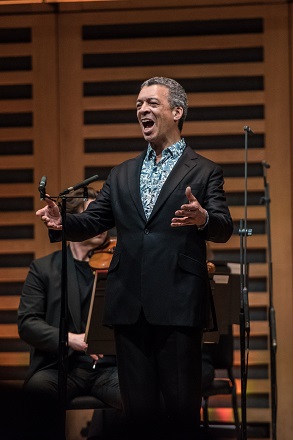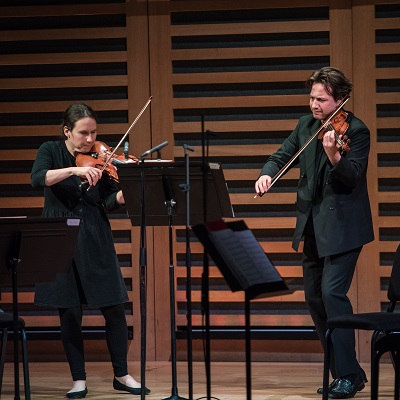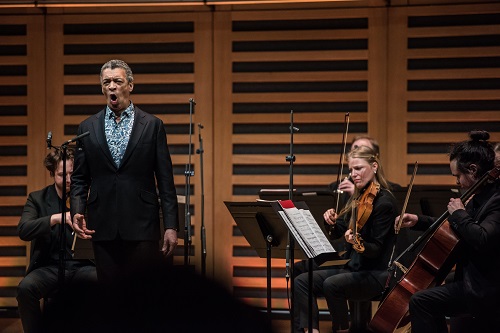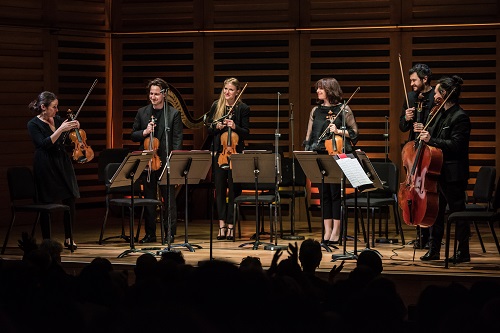“Love, meet me in the green glen,
Beside the tall elm-tree,
Where the sweetbriar smells so sweet agen.”
The poet-speaker’s call to his beloved to join him, at sunset, in the green glen, where the thyme blossom-scented air is canopied by hawthorn bowers, is an invitation to rediscover the intimacies of memory, which the glen – secret, safe, sensuous – preserves. Brian Elias’s setting of John Clare’s ‘Meet me in the Green Glen’ – the first song in an eponymous cycle of five Clare settings – was the perfect way to open this brilliantly curated programme at Kings Place – a programme which repeatedly offered such intimacies, nostalgic and nocturnal, soothing regret and sorrow with remembered joy, and lightening the darkness with dreams and moonbeams.
This was the first concert in baritone Roderick Williams’s 2022 Voices Unwrapped Artist-in-Focus series at Kings Place, in which he was joined by members of the Aurora Orchestra. Seated in Hall One, how delighted Brian Elias must have been to have Williams as his interpreter. Indeed, the whole programme confirmed Williams’ vocal and interpretative strengths: a beautiful and easily produced tone; a quasi-tenorial relaxation at the top of his range; immaculate diction and sensitivity to both textual and musical nuance; and, a warm, genial presence.

(c) Monika S Jakubowska/Kings Place
Elias’s unaccompanied melody was exquisitely shaped by Williams, the opening appeal curving enticingly, the long vowels extending mysteriously, the loneliness of the voice and the Aeolian modality casting a shade of wistfulness – the glen is distant and cannot be recovered. Williams did find the urgency in Clare’s poem, though, with its gliding vowels and lack of punctuation, and created a chant-like strength within the song’s tenderness. Vaughan Williams’s ‘The Woodcutter’s Song’, from The Pilgrim’s Progress, also has a strength in simplicity and here the haunting directness of the golden vocal line was complemented by Alexandra Wood’s dulcet obbligato (her violin replacing the clarinet which sings with the voice in the opera), which quietly joined Williams’s open-hearted melody-in-progress and ushered it towards the song’s humble close.
Wood was then herself joined by fellow violinist Alessandro Ruisi in three of Luciano Berio’s Duets for Two Violins, a collection of 34 duets composed between 1979-83 which originated in a remark by the musicologist Leonardo Pinzauti that there were few violin duets, other than those by Bartók, which might serve as a ‘work-out’ focusing on both violin technique and contemporary musical language. The short duets – each of which is named after its dedicatee – bring the two players together in complementary dialogues, juxtaposing contrary timbres, tempi, dynamics and articulation. Vaughan Williams’s folk-song melodism was sustained in Duet 24, ‘Aldo’ (Bennici), in which Wood’s con sordino Sicilian folk song, ‘E si fussi pisci’, was countered by Ruisi’s sul ponticelli accompaniment, creating an enchanting colour which captured some of the strange magic of the original Sicilian text: ‘If I were a fish, I would cross the sea, and if I were a bird I would come to you, And mouth to mouth I would like to kiss you, And face to face I would like to talk to you.’ These duets are unpretentious in manner but require considerable technical proficiency, as was evident in Duet 29, ‘Alfred’ (Schlee), where the striking down-bow energy was expertly controlled by the duo.

(c) Monika S. Jakubowska/Kings Place
If there was any slight hint of a false note in this programme, then perhaps it might have been the inclusion of three well-known Restoration theatre songs by Purcell, as arranged by Williams for string accompaniment – not because they were not sung and played with consummate craftmanship, nor because the baritone was not customarily scrupulous with his presentation of the texts, but because Williams’s natural ebullience, which the theatrical mode nurtured, seemed a little at odds with the more elegiac tone of the rest of the programme. ‘Ah, how sweet it is to love’ was beautiful, though, and ‘Music for a While’ eloquently phrased and structured.
Judith Weir’s Good Morning, Midnight, for voice, eight strings and two clarinets, transported us back to the intimate nocturnal worlds and reflections with which we had started – and to the simple economy which characterises John Clare’s expressive voice. The five poems which form Weir’s cycle are essentially a meditation on ‘the night’. The titular poem by Emily Dickinson is typically wry, simultaneously teasing and transcendent, and exudes an energy which the poet repeatedly finds in the darkness. Williams was a persuasive guide as Weir’s melody wound through the dashes and gasps of Dickinson’s idiosyncratic style – “But Morn – didn’t want me – now – / So – Goodnight – Day!” – and the sustained string harmonies were dynamically juxtaposed by restless clarinet fancies. Kathleen Jamie’s ‘Moon’ also juxtaposes darkness and light, to explore the loneliness and alienation of a mother and child: against a backdrop of silvery violins, which seemed to breathe with the spirit of the lunar pulsings, Williams poignantly conveyed the fluctuations of hope and heartache that the intermittent moonbeams bring. The sensitive imagery was tenderly etched – the moon is an traveller with a ‘small valise of darkness’ – and, at the close, the voice of the child, who addresses the indifferent moon spoke with directness, and an almost biblical certainty: “You are not my mother;/ with my mother, I waited unto death.”

An onomatopoeic soundscape of ticks and tocks, ra-ta-tats and ricochets, conjured Charles Simic’s sombre ‘Clocks of the Dead’, while ‘To the Moon’ (setting Giacomo Leopardi’s canto, ‘Alla luna’) was paradoxically almost operatic in its passionate intimacy, the nocturnal skyscape reflecting the protagonist’s immutable anguish, though Williams – and the soothing clarinet – also conveyed the comfort that the poet-speaker finds in the moon’s silent presence. Weir’s cycle returns to Dickinson in the final song. ‘Lightly stepped a yellow star’ did indeed step with a lightness of touch – the four violins’ pianissimo flourishes at the start were magical – though there was also an uplifting musical luminosity, most especially in the rapturous instrumental postlude.
After the interval we had two substantial works. Iain Farrington’s arrangement of Mahler’s Lieder eines fahrenden Gesellen retains the chamber-like lucidity of Mahler’s original, though it dispenses with the piano and harmonium that Arnold Schoenberg added in the arrangement which he made for performance at the subscription concerts of the Society for Private Musical Performances, which he founded in 1918. The members of Aurora relished their soloistic roles and one advantage of the sparser texture was that Williams was able to use the text to create a stirring but consoling closeness with the listener. There was certainty and warmth here, despite the textual doubts. Williams was beautifully ‘dreamy’ and fresh-voiced in the second song, ‘Ging heut’ Morgen über’s Feld’ (I walked across the fields this morning), making the audience his emotional confidante. ‘Ich hab’ ein glühend Messer’ (I’ve a gleaming knife) was tense and angry, but the legato line never broken, and Williams was especially discerning in the climactic outpouring, “Oh weh! Ich wollt’ ich läg’ auf der schwarzen Bahr’” (I wish I could lay down on my black bier).

The peak of this performance, for this listener, though, was reached in the instrumental work which preceded Mahler’s lovelorn contemplations. I think this was perhaps the most engaging and persuasive performance of Schoenberg’s Verklärte Nacht that I have heard, certainly in the original sextet version. This was a lucid, superbly structured, immaculately rendered account. A work that can sometimes seem overblown and heavy was, here, pristine, elegant, touchingly expressive. The clarity of the motivic articulation and the counterpoint was simply wonderful. Much of that was due to Alexandra Wood’s unobtrusive but unceasingly alert leadership: it’s a fiendish first fiddle part but so technically assured is Wood that she ‘felt’ not only her own contribution but that of each of her five fellow musicians. But, she was not alone in reaching such captivating musical heights. Watching viola player Hélène Clément commune with cellist Sébastien van Kuijk in their melodic dialogues, and sensing the joy Alessandro Ruisi found in the second violin’s string-crossing tremors at the very close – and during countless other moments of detailed, discerning musicality – one felt that the musicians were playing ‘for themselves’ as much as ‘for us’, and we were all the richer for it.
Claire Seymour
Roderick Williams (baritone), members of the Aurora Orchestra
Elias – ‘Meet me in the Green Glen’; Vaughan Williams – ‘The Woodcutter’s Song’ from Pilgrim’s Progress; Berio – Duet for Two Violins (24 ‘Aldo’, 27 ‘Alfredo’, 29 ‘Alfred’); Purcell (arr. Williams) – ‘If Music be the food of love’, ‘Ah! How sweet it is to love’, ‘Music for a while’; Weir – Good Morning, Midnight!; Schoenberg – Verklärte Nacht; Mahler (arr. Farrington) – Lieder eines fahrenden Gesellen
Kings Place, London; Friday 25th February 2022.
ABOVE: Roderick Williams and members of the Aurora Orchestra (c) Monika S. Jakubowska/Kings Place